|
Walter was the master of the single note and his characteristic walking bass line (usually with a deep tone and selection of notes that is unsurpassed) is instantly recognizable. As an accompanist, he had few equals. His backup harp was always unobtrusive yet bright and fresh -- enhancing whatever else is going on. Give Big Walter a chance to solo and you were in for some of the most tasteful lines Chicago-style harp has ever produced. He made a specialty of playing entire tunes (often in blues style) on the harmonica ("La Cucaracha," "Careless Love," "I Almost Lost My Mind," etc). This might sound trite, but give them a listen. You'll see. As for harmonicas, he used Hohner's Marine Band. He was just as comfortable playing first position (A harp in the key of A) as with the more standard cross harp (D harp in the key of A). He did not do much with chromatic harmonicas. Although Big Walter could play in the style of other harp players (and was often asked to do so), he has no credible imitators. He is one of a kind. Walter Horton was born in Horn Lake, MS (April 6, 1917), but his mother soon moved to Memphis where Walter taught himself how to play the harmonica at five years of age. He later learned more about his instrument by working with harp players Will Shade and Hammie Nixon. In the late '20s, he performed and recorded with the Memphis Jug Band (1927) and generally worked the Southern dance and juke-joint circuit as well as Memphis street corners. Horton moved to Chicago in the late '40s, but was often to be found back in Memphis for recording dates with Sun and Modern/RPM labels. He claimed to be blowing amplified harp as early as 1940, which would make him the first. Johnny Shines recalls that Sonny Boy Williamson (Rice Miller) used to come to Walter for lessons. He also says that he used the name "Little Walter" before the Little Walter Jacobs did, but gave it up to Jacobs. Jacobs acknowledges that he "ran" with Big Walter in Memphis during the 1940s. Horton later called himself "Big Walter" to distinguish himself. The term "Shakey" came from the way he moved his head while playing.
Over the next few years, Horton worked with Chicago blues artists such as Johnny Shines, Jimmy Rogers, and Otis Rush -- both in the Chicago blues clubs and at record studios. He recorded with Chess, Cobra, and States throughout the 1950s. During the 1960s, Horton continued to work with Jimmy Rogers, Shines, Tampa Red, Big Mama Thornton, Robert Nighthawk, Johnny Young, and Howlin' Wolf. In the 1970s, Walter was active in the blues clubs, in recording studios, and also began to appear at blues and folk festivals -- primarily with Willie Dixon's Blues All-Stars. He died in Chicago on Dec. 8, 1981, and was inducted into the Blues Foundation's Hall of Fame in 1982.
The recording of "Easy" with guitarist Jimmy DeBerry (recorded by Sam Phillips of Sun Records in the early '50s) is a striking harp instrumental that remains unrivaled for sheer power. For a superb example of Big Walter playing behind Muddy Waters (and soloing), try the cut "Mad Love (I Want You to Love Me)" that was recorded in 1953. Walter also plays on the classic Jimmy Rogers tune "Walking by Myself," on the Otis Rush tune "I Can't Quit You Baby," and many others. Also hear great Walter on the Flyright album, Johnny Shines & Robert Lockwood, Joe Hill Louis: The Be-bop Boy on Bear Family, Memphis Harmonica 1951- 1954 on Sun, and The Blues Came Down from Memphis on Charly. This last album contains the incredible instrumental, "Easy."
But if you want to hear Walter at his best, pick up the Vanguard CD Chicago/The Blues/Today!, Volume 3 and listen to the music Walter lays down. Both as backup harp and in solos, this is not only classic Big Walter, but Chicago blues at its finest -- not to be missed. The music on this album is incredible -- Horton's contrapuntal backup harp seems to float in the background, loping along, always stretching and opening up the time. And Horton's taste in notes and depth of tone is unparalleled in the history of amplified Chicago-style harmonica. As Willie Dixon says, "Big Walter is the best harmonica player I ever heard." I agree. He was the man. ~ Michael Erlewine
Additional Biographical Info: "When Big Walter played the blues fell all over you." The words are from record producer Sam Phillips, who recorded Big Walter Horton in the early 50's. But Phillips wasn't the only one who felt that way. Indeed everywhere Big Walyer played, his music was so emotional, so creative and so subtle that people simply couldn't forget him. Born in 1917 in Mississippi, Big Walter was playing professionally by the age of 12 when he recorded with the great Memphis Jug Band. Even then, he had the ability to present his music in a sensitive, soulful way. His youth was spent travelling throughout the Delta, jamming wherever he could - at house parties, fishfries, roadhouses. When he began working with Sam Phillips in the early 50's, Horton's self-taught playing style played a major role in the rhythm and blues renaissance. His solos could last ten minutes or longer, elaborating on a simple melody with constant invention, subtlety and technique. Eventually Big Walter left Memphis for Chicago to play with the likes of Jimmy Lunceford, Earl Hines, Johnny Shines, Jimmy Rogers, Otis Rush and other Chicago legends. After that, he began playing what's know known as the Chicago Blues, and shared the stage with one of the greatest of all Chicago bandleaders, Muddy Waters. It was then that his friendship with Willie Dixon began. One that would last some 20 years. Also known as "Boss of the Blues Harmonica," Big Walter could make his harmonica purr, roar and cry. And he never strayed from exploring the gut-level feelings the blues are famous for. According to Willie Dixon, Big Walter "was the best blues harmonica player in the world." - Courtesy of M.Hohner
|
||
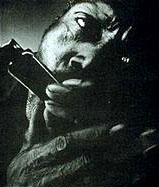 BORN:
April 6, 1917, Horn Lake, MS
BORN:
April 6, 1917, Horn Lake, MS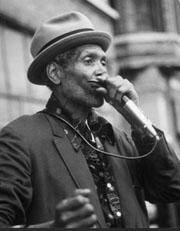
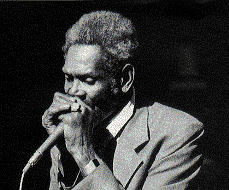 He
recorded four sides in 1951 for the Modern/RPM label under
the name "Mumbles," but was not fond of that moniker. It was
not until 1953 that he really left Memphis and relocated to
Chicago to work as a sideman with his friend Eddie
Taylor. He soon joined the Muddy Waters band
(replacing Junior Wells, who had been drafted into
the military) and played with Muddy for about a
year.
He
recorded four sides in 1951 for the Modern/RPM label under
the name "Mumbles," but was not fond of that moniker. It was
not until 1953 that he really left Memphis and relocated to
Chicago to work as a sideman with his friend Eddie
Taylor. He soon joined the Muddy Waters band
(replacing Junior Wells, who had been drafted into
the military) and played with Muddy for about a
year.
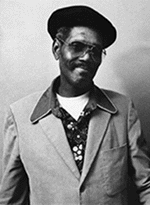 While
his early acoustic recordings in Memphis (1951-2954) are
excellent, it is the recordings from the late '50s and
mid-'60s that are unrivaled. When Horton's music is
discussed in print, often the reference is to his later
albums on Blind Pig (Can't Keep Lovin' You and
Fine Cuts) and Alligator (Big Walter
Horton with Carey Bell). I don't want to take
anything away from these albums, but this is not what has
made Walter a legend. Here is what has:
While
his early acoustic recordings in Memphis (1951-2954) are
excellent, it is the recordings from the late '50s and
mid-'60s that are unrivaled. When Horton's music is
discussed in print, often the reference is to his later
albums on Blind Pig (Can't Keep Lovin' You and
Fine Cuts) and Alligator (Big Walter
Horton with Carey Bell). I don't want to take
anything away from these albums, but this is not what has
made Walter a legend. Here is what has:
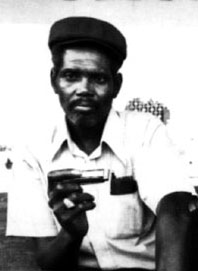 Walter's
singing is seldom mentioned except in an apologetic way.
This is something I have never understood. I love to hear
Walter sing and his singing style has all the
elements of his harp playing, in particular, sincerity and
(above all) humor. Make a point to listen to some Big
Walter songs like "Need My Baby," "Everybody's Fishin',
"and "Have a Good Time." They are priceless. His original
recording of "Hard Hearted Woman" on the album Chicago
Blues -- the Early Fifties (Blues Classics) never
fails to raise the hair on the back of my neck. His
hard-to-find first album for Chess, The Soul of Blues
Harmonica, is also worth a listen, although not
definitive.
Walter's
singing is seldom mentioned except in an apologetic way.
This is something I have never understood. I love to hear
Walter sing and his singing style has all the
elements of his harp playing, in particular, sincerity and
(above all) humor. Make a point to listen to some Big
Walter songs like "Need My Baby," "Everybody's Fishin',
"and "Have a Good Time." They are priceless. His original
recording of "Hard Hearted Woman" on the album Chicago
Blues -- the Early Fifties (Blues Classics) never
fails to raise the hair on the back of my neck. His
hard-to-find first album for Chess, The Soul of Blues
Harmonica, is also worth a listen, although not
definitive.